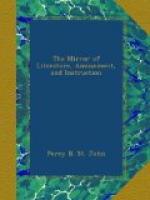He affects to dislike hearing his works praised or referred to; I say affects, because I am sure it is not real or natural; as he who loves praise, as Byron evidently does, in other things, cannot dislike it for that in which he must be conscious it is deserved. He refers to his feats in horsemanship, shooting at a mark, and swimming, in a way that proves he likes to be complimented on them; and nothing appears to give him more satisfaction than being considered a man of fashion, who had great success in fashionable society in London, when he resided there. He is peculiarly compassionate to the poor; I remarked that he rarely, in our rides, passed a mendicant without giving him charity, which was invariably bestowed with gentleness and kindness; this was still more observable if the person was deformed, as if he sympathized with the object.
Byron is very fond of gossiping, and of hearing what is going on in the London fashionable world; his friends keep him au courant, and any little scandal amuses him very much. I observed this to him one day, and added, that I thought his mind had been too great to descend to such trifles! he laughed and said with mock gravity, “Don’t you know that the trunk of an elephant that can lift the most ponderous weights, disdains not to take up the most minute? This is the case with my great mind, (laughing anew,) and you must allow the simile is worthy the subject. Jesting apart, I do like a little scandal—I believe all English people do. An Italian lady, Madame Benzoni, talking to me on the prevalence of this taste among my compatriots, observed, that when she first knew the English, she thought them the most spiteful and ill-natured people in the world, from hearing them constantly repeating evil of each other; but having seen various amiable traits in their characters, she had arrived at the conclusion, that they were not naturally mechant; but that living in a country like England, where severity of morals punishes so heavily any dereliction from propriety, each individual, to prove personal correctness, was compelled to attack the sins of his or her acquaintance, as it furnished an opportunity of expressing their abhorrence by words, instead of proving it by actions, which might cause some self-denial to themselves. This,” said Byron, “was an ingenious, as well as charitable supposition; and we must all allow that it is infinitely more easy to decry and expose the sins of others, than to correct our own; and many find the first so agreeable an occupation, that it precludes the second—this, at least, is my case.”




